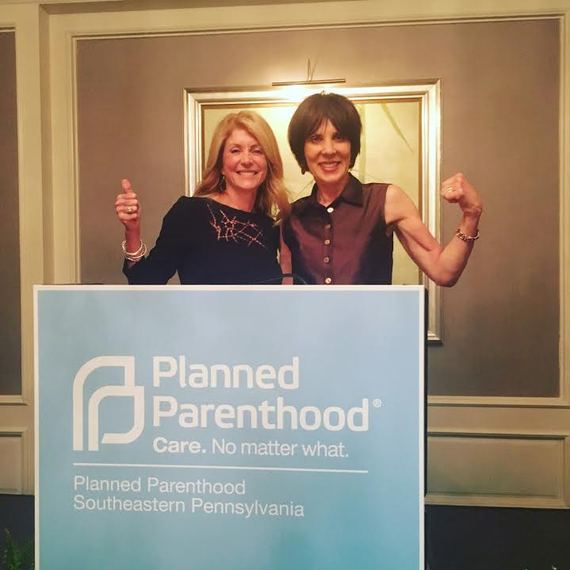Wendy Davis, the former Texas state senator who electrified the nation with her 11- hour- filibuster of the Texas legislature to defend the rights of women to have safe, legal abortions, was the keynote speaker at a Planned Parenthood of Southeastern Pennsylvania fundraiser in Philadelphia on May 24. The event had the feeling of a family reunion. Many of the women in attendance, such as former Pennsylvania state senator Constance Williams; have long fought for reproductive rights in a state where anti-choice Republicans dominate the legislature.
A surprising amount of men, including Philadelphia Mayor Jim Kenney, came out in support of Planned Parenthood. There was only one group of people missing. No hands were raised when the president of Planned Parenthood of Southeastern Pennsylvania, Dayle Steinberg, asked if there were any Republicans in the room. Apparently, the partisan divide has become so great that moderate Republican women from the Philadelphia suburbs are no longer willing to support a non-profit that provides vital health services, such as pap smears and screenings for sexual transmitted diseases, to the community.
Davis provided the audience with the current status of Texas Senate Bill 5 that she infamously filibustered. The bill, which banned abortions from being performed after 20 weeks of pregnancy, required abortion clinics to meet the same standards as hospital-style surgical centers, and mandated doctors who performs abortions have admitting privileges at a nearby hospital, was eventually signed into law. The Supreme Court is currently deciding on the constitutionality of the law with a decision is expected to be handed down this month. Davis said, "The bill I opposed would have most certainly endangered women's health in Texas, yet it was argued it would actually improve women's health. When it did pass, our fears that women would be harmed by it were certainly shown to be well placed. They closed over half our clinics in the state. We had 42 at the time. We have 19 now. If the law is fully implemented, we will have 9 or 10 in a state in a state of 27 million people with 5 million women of reproductive age."
She ticked off some of the devastating human impact of that law. "Not surprising at all, the self induced abortion rate in our state is dramatically on the rise. The remaining clinics are having to push women to wait later and later into their pregnancies in order to have abortion care because their wait lists have grown so large. We have seen an increase in Medicaid birth rates and, of course, a corresponding cost to taxpayers as a result of those births," said Davis.
Despite this, Davis is optimistic about the future of women's reproductive rights. In an interview before the event, she said, "By 2020, millennials will occupy 40% of the total voting population in this country. They literally could change and I believe will change the political conversation as a result. When they are talked to and questioned about their beliefs and ideas about what's fair, right and good, they are very progressive overall. They believe attacks on people because of their sexuality, race, gender, or reproductive assaults are terrible. When they come into their own, understand the power of their own voices at the ballot box, and in other ways, they are going to shift this. They are going to move us out of this place. I honestly don't think we will go back there."
Davis, who is an important surrogate for Hillary Clinton, blamed misogyny for the polls that show Clinton and Trump tied in the presidential race. She experienced similar treatment during her unsuccessful race for governor of Texas.
She noted, "Misogyny is the last, outwardly acceptable blatant form of discrimination. It is so frustrating to see it. There is a world in which those things have been accepted for such a long time and it's not going to go away unless and until we begin more and more to call it out, name it, and push back on it. I think it is going to take a strategic and collective effort for us to do it. There are things that are said about women today that if you inserted sexual orientation, race, or religion, it would be treated with such condemnation. Yet, things are said about women are so commonplace that we accept them as normal."
She suggests that women start calling it out every single time we hear it. "I am starting to do that as part of this presidential race," said Davis. "When we see Hillary being treated in a way that is driven purely by misogyny, it is our role to play in making sure we are bringing people present to the fact that is what is happening, invite them to check themselves, and to not respond favorably that. We especially need to bring our girls and young women up in a culture where we explain to them that is not acceptable. We need to sensitive them to pushing back on it."

